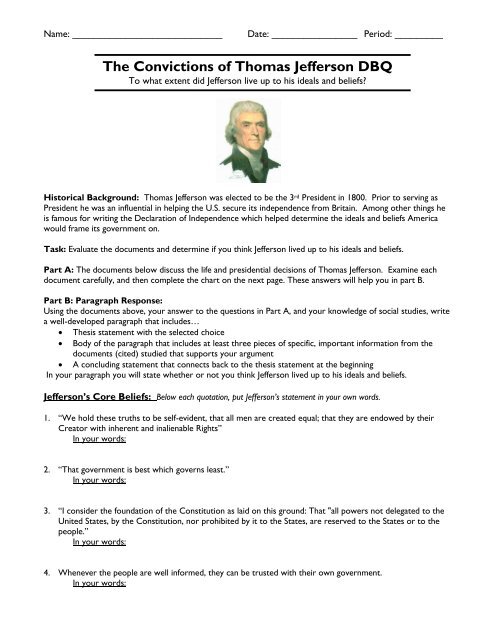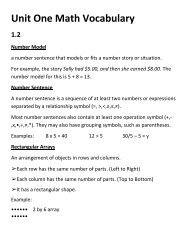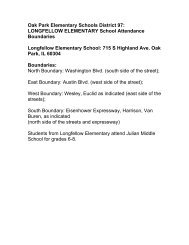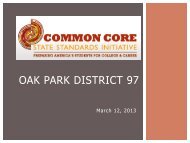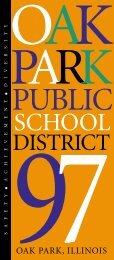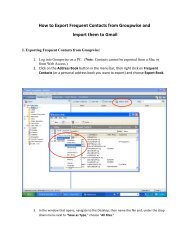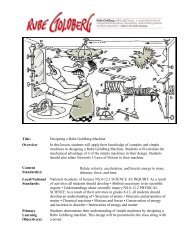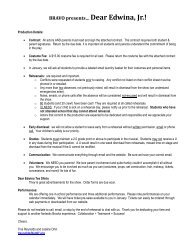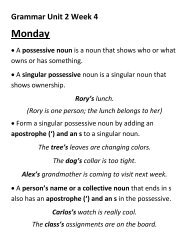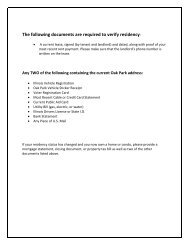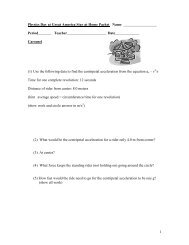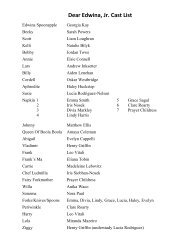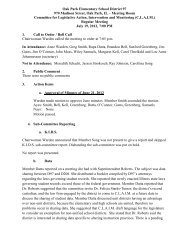The Convictions of Thomas Jefferson DBQ
The Convictions of Thomas Jefferson DBQ
The Convictions of Thomas Jefferson DBQ
Create successful ePaper yourself
Turn your PDF publications into a flip-book with our unique Google optimized e-Paper software.
Name: ____________________________<br />
Date: ________________ Period: _________<br />
<strong>The</strong> <strong>Convictions</strong> <strong>of</strong> <strong>Thomas</strong> <strong>Jefferson</strong> <strong>DBQ</strong><br />
To what extent did <strong>Jefferson</strong> live up to his ideals and beliefs?<br />
Historical Background: <strong>Thomas</strong> <strong>Jefferson</strong> was elected to be the 3 rd President in 1800. Prior to serving as<br />
President he was an influential in helping the U.S. secure its independence from Britain. Among other things he<br />
is famous for writing the Declaration <strong>of</strong> Independence which helped determine the ideals and beliefs America<br />
would frame its government on.<br />
Task: Evaluate the documents and determine if you think <strong>Jefferson</strong> lived up to his ideals and beliefs.<br />
Part A: <strong>The</strong> documents below discuss the life and presidential decisions <strong>of</strong> <strong>Thomas</strong> <strong>Jefferson</strong>. Examine each<br />
document carefully, and then complete the chart on the next page. <strong>The</strong>se answers will help you in part B.<br />
Part B: Paragraph Response:<br />
Using the documents above, your answer to the questions in Part A, and your knowledge <strong>of</strong> social studies, write<br />
a well-developed paragraph that includes…<br />
<strong>The</strong>sis statement with the selected choice<br />
Body <strong>of</strong> the paragraph that includes at least three pieces <strong>of</strong> specific, important information from the<br />
documents (cited) studied that supports your argument<br />
A concluding statement that connects back to the thesis statement at the beginning<br />
In your paragraph you will state whether or not you think <strong>Jefferson</strong> lived up to his ideals and beliefs.<br />
<strong>Jefferson</strong>’s Core Beliefs: Below each quotation, put <strong>Jefferson</strong>’s statement in your own words.<br />
1. “We hold these truths to be self-evident, that all men are created equal; that they are endowed by their<br />
Creator with inherent and inalienable Rights”<br />
In your words:<br />
2. “That government is best which governs least.”<br />
In your words:<br />
3. “I consider the foundation <strong>of</strong> the Constitution as laid on this ground: That "all powers not delegated to the<br />
United States, by the Constitution, nor prohibited by it to the States, are reserved to the States or to the<br />
people.”<br />
In your words:<br />
4. Whenever the people are well informed, they can be trusted with their own government.<br />
In your words:
<strong>Jefferson</strong> Document sheet<br />
Directions: Working with your partner, carefully read the documents provided. For each document,<br />
summarize what it tells you about <strong>Jefferson</strong>. <strong>The</strong>n, reflect on whether the document provides an example <strong>of</strong><br />
<strong>Jefferson</strong> upholding his beliefs or betraying them.<br />
Document<br />
What did you learn about <strong>Jefferson</strong> from this<br />
document?<br />
Does this document provide an example <strong>of</strong><br />
<strong>Jefferson</strong> upholding his beliefs or betraying them?<br />
Explain why.<br />
1<br />
2<br />
3<br />
4<br />
5<br />
6<br />
7
Name: ____________________________<br />
Date: ________________ Period: _________<br />
<strong>Thomas</strong> <strong>Jefferson</strong><br />
Essential Skill: Writing a well-organized paragraph<br />
Directions: Using the documents above, your answer to the questions in Part A, and your knowledge <strong>of</strong> social<br />
studies, write a well-developed paragraph that includes…<br />
<strong>The</strong>sis statement with the selected choice<br />
Body <strong>of</strong> the paragraph that includes at least three pieces <strong>of</strong> specific, important information from the<br />
documents (cited) studied that supports your argument<br />
o Use correct citation in your paragraph, i.e. (Document 1)<br />
A concluding statement that connects back to the thesis statement at the beginning<br />
Essential Questions: To what extent did <strong>Jefferson</strong> live up to his ideals and<br />
beliefs?<br />
________________________________________________________________________________________________<br />
________________________________________________________________________________________________<br />
________________________________________________________________________________________________<br />
________________________________________________________________________________________________<br />
________________________________________________________________________________________________<br />
________________________________________________________________________________________________<br />
________________________________________________________________________________________________<br />
________________________________________________________________________________________________<br />
________________________________________________________________________________________________<br />
________________________________________________________________________________________________<br />
________________________________________________________________________________________________<br />
________________________________________________________________________________________________<br />
________________________________________________________________________________________________<br />
________________________________________________________________________________________________<br />
________________________________________________________________________________________________<br />
________________________________________________________________________________________________<br />
________________________________________________________________________________________________<br />
________________________________________________________________________________________________
Document 1: Reporter’s Account <strong>of</strong> <strong>Jefferson</strong>’s Inauguration<br />
<strong>The</strong> weather was mild and beautiful. <strong>Jefferson</strong>’s dress was, as usual, that without any<br />
distinctive badge <strong>of</strong> <strong>of</strong>fice. He broke precedent by walking to and from his swearing-in ceremony,<br />
rather than riding in a carriage as Washington and Adams did. A simple man <strong>of</strong> the people—he was<br />
even seen without his powdered wig at the Inaugural Ball.<br />
Document 2: Letter from <strong>Jefferson</strong> on Slaves<br />
To Edward Coles [Monticello Aug. 25. 1814]<br />
Man, probably <strong>of</strong> any colour, but <strong>of</strong> this color (black) we know, brought up from their infancy<br />
without necessity for thought or forecast, are by their habits rendered (made) as incapable as<br />
children <strong>of</strong> taking care <strong>of</strong> themselves. In the meantime they are pests in society by their idleness<br />
(being without a job)... <strong>The</strong>ir combination with the other colour (white) produces a disgrace which<br />
no lover <strong>of</strong> this country, no lover <strong>of</strong> excellence in the human character can innocently approve <strong>of</strong>...<br />
Document 3: <strong>Jefferson</strong>’s Proposal for a Bill<br />
“My bill proposes: Elementary schools in every county, which shall place every householder within<br />
three miles <strong>of</strong> a school…To all <strong>of</strong> which is added a selection from the elementary schools <strong>of</strong><br />
subjects <strong>of</strong> the most promising genius, whose parents are too poor to give them further education,<br />
to be carried at the public expense…<strong>The</strong> object is to bring into action that mass <strong>of</strong> talents which<br />
lies buried in poverty in every country…”
Document 4: Slaves on <strong>Jefferson</strong>’s Plantation<br />
<strong>Jefferson</strong> lived in Virginia on a plantation called Monticello. About eighty slaves lived and worked<br />
at Monticello. <strong>The</strong>y plowed the fields, planted the wheat, and drove the wagons. <strong>The</strong>y cared for<br />
the hogs and cows. Household slaves fixed food for <strong>Thomas</strong> <strong>Jefferson</strong> and his family. <strong>The</strong>y washed<br />
his clothes and cared for his children. <strong>The</strong> lives <strong>of</strong> <strong>Jefferson</strong> and his family were linked with the<br />
lives <strong>of</strong> his enslaved workers.<br />
By law, <strong>Jefferson</strong>’s slaves were his property. That meant he could buy and sell them. He could give<br />
them away. He could hire them out to other farmers. Slaves who didn’t obey were punished. And<br />
<strong>Jefferson</strong> granted freedom to only seven slaves.<br />
Document 5: Memoirs <strong>of</strong> Madison Hemings [1873]<br />
About the time <strong>of</strong> [<strong>Thomas</strong> <strong>Jefferson</strong>'s appointment as minister to France] and before he was ready<br />
to leave the country his wife died, and soon after her burial...he left for France, taking his eldest<br />
daughter with him. My mother [Sally Hemings] accompanied <strong>Jefferson</strong>’s daughter as a servant...<strong>The</strong>ir<br />
stay was about eighteen months. But during that time my mother became Mr. <strong>Jefferson</strong>'s lover, and<br />
when she was called back home she was enceinte [i.e. pregnant] by him. He desired to bring my<br />
mother back to Virginia with him but she objected. She was just beginning to understand the French<br />
language well, and in France she was free, while if she returned to Virginia she would be re-enslaved.<br />
So she refused to return with him. To induce her to do so he promised extraordinary privileges, and<br />
made a solemn pledge that her children should be freed at the age <strong>of</strong> twenty-one years. In<br />
consequence <strong>of</strong> his promise...she returned with him to Virginia. Soon after their arrival, she gave<br />
birth to a child, <strong>of</strong> whom <strong>Thomas</strong> <strong>Jefferson</strong> was the father. It lived but a short time. She gave birth to<br />
four others, and <strong>Jefferson</strong> was the father <strong>of</strong> all <strong>of</strong> them. <strong>The</strong>ir names were Beverly, Harriet, Madison<br />
(myself), and Eston--three sons and one daughter. We all became free agreeably to the treaty<br />
entered into by our parents before we were born. We all married and have raised families....
Document 6: Louisiana Purchase<br />
Finalizing the deal with France had no Constitutional precedent. Nowhere in the Constitution could<br />
<strong>Jefferson</strong> find mention <strong>of</strong> the purchase <strong>of</strong> land from foreign powers. <strong>Jefferson</strong> struggled over whether to<br />
suggest an amendment or whether to finalize the deal without constitutional approval. In a letter to Wilson<br />
Cary Nicholas in 1803, <strong>Jefferson</strong> summarizes his internal conflict:<br />
“When an instrument admits two constructions, the one safe, the other dangerous, the one precise, the other<br />
indefinite, I prefer that which is safe & precise. I had rather ask an enlargement <strong>of</strong> power from the nation where it is<br />
found necessary, than to assume it by a construction which would make our powers boundless.”<br />
Eventually, <strong>Jefferson</strong> was convinced by advisers, including <strong>Thomas</strong> Paine (Common Sense) that the transaction<br />
was not beyond the scope <strong>of</strong> the Constitution. <strong>Jefferson</strong> purchased the land from France in 1803 and<br />
effectively doubled the size <strong>of</strong> the U.S.<br />
Document 7: Historian’s Account <strong>of</strong> <strong>Jefferson</strong>’s Presidency<br />
<strong>Jefferson</strong> tried to shrink the government and cut costs wherever possible. He reduced the size <strong>of</strong><br />
the army, halted a planned expansion <strong>of</strong> the navy, and lowered expenses for government social<br />
functions. He also rolled back Hamilton’s economic program by eliminating all internal taxes and<br />
reducing the influence <strong>of</strong> the Bank <strong>of</strong> the United States. <strong>Jefferson</strong> favored free trade rather than<br />
government-controlled trade and tariffs.


